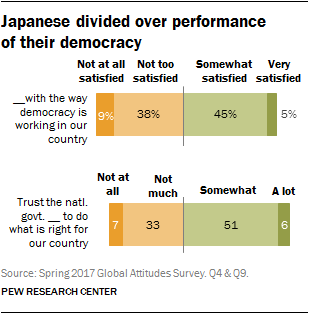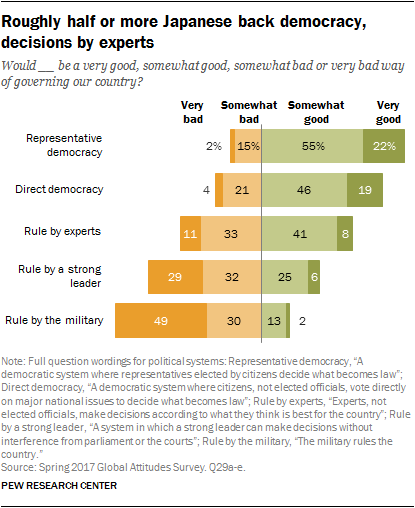 The Japanese public is split in its overall satisfaction with Japan’s democracy, while expressing slightly more trust in the national government.
The Japanese public is split in its overall satisfaction with Japan’s democracy, while expressing slightly more trust in the national government.
Though just 6% of Japanese have a lot of trust in their national government to do what is right for Japan, 51% have some trust. Such confidence (a total of 57%) is lower than in the Netherlands (71%), Germany (69%), or Sweden (67%). But Japanese trust is higher than that expressed by people in the United States (51%), the United Kingdom (49%) and Australia (48%).
Meanwhile, only half the Japanese are happy with the state of Japan’s democracy: 5% say they are very satisfied with the way democracy is working in their country, and another 45% are somewhat satisfied. Meanwhile, 47% are not satisfied. It is Japanese ages 30 to 49 (50% dissatisfied) and those ages 50 and older (48% dissatisfied) who are most uneasy. Just 32% of those ages 18 to 29 are displeased.
Notably, those who are dissatisfied with Japanese democracy overwhelmingly do not trust the government to do the right thing, and those who do not trust the government are widely dissatisfied with Japanese democracy.
 Divided in their views on the functioning of Japanese democracy, some see value in other ways of running the nation. While 77% say a good way to govern the country is a democratic system where representatives elected by citizens decide what becomes law, 65% also believe it would be good if citizens, not elected officials, vote directly on major national issues to decide what becomes law. Another 49% say it would be good if experts, not elected officials, make decisions according to what they think is best for the country.
Divided in their views on the functioning of Japanese democracy, some see value in other ways of running the nation. While 77% say a good way to govern the country is a democratic system where representatives elected by citizens decide what becomes law, 65% also believe it would be good if citizens, not elected officials, vote directly on major national issues to decide what becomes law. Another 49% say it would be good if experts, not elected officials, make decisions according to what they think is best for the country.
About three-in-ten (31%) favor a strong leader to make decisions without interference from parliament or the courts. Roughly a third (35%) of those Japanese with a secondary school education or less favor a government run by a strong leader, while only a quarter (25%) of those with more than a secondary education agree.
Just 15% support military rule and 49% say this type of governance – similar to that of Japan during World War II – would be a very bad way to rule the country. But among the small minority who favor military control, those with a secondary education or less (19%) are about twice as likely as those with more than a secondary education (8%) to back such rule.
Young Japanese (ages 18 to 29) are more satisfied than their elders (ages 50 and older) with the way Japanese democracy is working, with a 10-percentage-point generation gap. But they are more supportive of government decision-making by experts. There is an 18-point difference in views on a technocracy: 63% of 18- to 29-year-old Japanese but just 45% of those ages 50 and older favor experts, not elected officials, making decisions according to what they think is best for the country.


